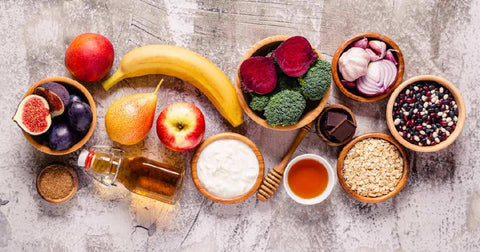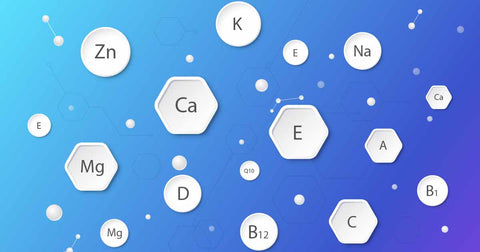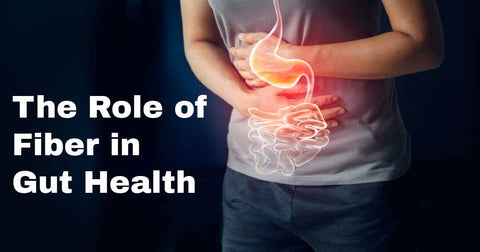In recent years, there has been a surge of interest in gut health and its profound impact on our overall well-being. Research has revealed that the trillions of microorganisms residing in our digestive tract, collectively known as the gut microbiome, play a pivotal role in maintaining our health. As we delve deeper into the complex world of gut health, one term that keeps surfacing is "prebiotic fibers." But what exactly are prebiotic fibers, and why should you care about them?
Prebiotic fibers, a class of dietary fibers, have gained recognition for their vital role in nurturing a thriving gut microbiome. They are not to be confused with probiotics, which are live beneficial bacteria. Instead, prebiotic fibers are the nourishment that fuels the good bacteria already present in your gut. Understanding the significance of prebiotic fibers is a key step toward making informed dietary choices that can enhance your gut health and, in turn, benefit your overall health.
What Are Prebiotic Fibers?

Prebiotic fibers, as the name suggests, are a type of dietary fiber. However, they are unique because they are not directly digested by our bodies. Instead, they serve as a source of nourishment for the beneficial bacteria that reside in our gut. In essence, prebiotic fibers act as fertilizer for the probiotics in our digestive system, promoting their growth and activity.
These fibers are typically non-digestible, meaning that they pass through the upper part of our gastrointestinal tract largely intact. Once they reach the colon, they become a valuable source of nutrition for the gut microbiome.
Prebiotic fibers come in various forms, and each type has its own distinct characteristics and health benefits. Common prebiotic fibers include inulin, fructooligosaccharides (FOS), galactooligosaccharides (GOS), and resistant starch. These can be found in a wide range of foods, including fruits, vegetables, legumes, whole grains, and some dairy products.
If you're interested in incorporating more prebiotic fibers into your diet, you'll be pleased to know that there are plenty of natural food sources to choose from. Foods like garlic, onions, leeks, asparagus, bananas, and whole grains are excellent sources of prebiotic fibers. As you'll discover later in this article, integrating these foods into your diet can have a positive impact on your gut health.
The Gut Microbiome and Its Importance
The gut microbiome is a complex ecosystem consisting of trillions of microorganisms, including bacteria, viruses, fungi, and other microbes, residing within your gastrointestinal tract. These tiny inhabitants play a vital role in breaking down food, absorbing nutrients, and regulating various bodily functions. The composition of your gut microbiome can vary greatly from person to person, influenced by factors like genetics, diet, and lifestyle.
The gut microbiome isn't just responsible for digestion; it has far-reaching effects on your overall health. Recent research has linked the gut microbiome to various aspects of well-being, including immune system function, mental health, metabolism, and even chronic disease risk. A balanced and diverse gut microbiome is essential for maintaining optimal health and preventing a wide range of health issues.
Prebiotic fibers are instrumental in nurturing a diverse and balanced gut microbiome. By providing nourishment for beneficial bacteria, these fibers help maintain an environment that supports the growth of health-promoting microbes while inhibiting the proliferation of harmful ones. This balance is crucial for ensuring that your gut microbiome functions optimally, promoting better digestion, nutrient absorption, and overall well-being.
Health Benefits of Prebiotic Fibers

One of the most immediate benefits of prebiotic fibers is their positive impact on digestive health. These fibers help prevent constipation and promote regular bowel movements by increasing the bulk and softness of stool. Moreover, they can aid in reducing the risk of common digestive issues, such as irritable bowel syndrome (IBS) and diverticulitis.
Prebiotic fibers play an important role in enhancing the absorption of essential nutrients, such as calcium and magnesium. By fostering a healthy gut microbiome, they ensure that your body can effectively extract nutrients from the foods you consume, ultimately contributing to better overall health.
A robust gut microbiome is closely linked to a strong immune system. Prebiotic fibers help maintain this by supporting the growth of beneficial bacteria that actively contribute to immune function. A balanced microbiome can aid in the body's defense against infections and diseases, making prebiotic fibers an important component of a healthy diet.
For those looking to manage their weight, prebiotic fibers can be a valuable ally. These fibers promote feelings of fullness, reducing overall calorie intake. Furthermore, they may help regulate appetite and prevent overeating, potentially contributing to weight loss or weight maintenance.
Prebiotic Fibers and Disease Prevention
Chronic inflammation is at the root of many diseases, including heart disease, diabetes, and certain types of cancer. Prebiotic fibers have shown promise in reducing inflammation in the body by promoting a healthy gut microbiome. The balance they help maintain can lower the production of pro-inflammatory compounds, contributing to a decreased risk of chronic diseases.
The benefits of prebiotic fibers extend to the prevention of chronic diseases. A healthy gut microbiome, maintained by these fibers, can help regulate blood sugar levels and reduce the risk of type 2 diabetes. Additionally, they can aid in controlling cholesterol levels, lowering the risk of heart disease, and even play a role in reducing the likelihood of certain cancers.
Beyond general health benefits, prebiotic fibers are showing promise in managing specific medical conditions. Conditions such as irritable bowel syndrome (IBS), inflammatory bowel disease (IBD), and even allergies may benefit from a diet rich in prebiotic fibers. While more research is needed, it's becoming increasingly clear that prebiotic fibers have the potential to transform how we approach the management of various health conditions.
Incorporating Prebiotic Fibers into Your Diet
 Now that we understand the significance of prebiotic fibers, you may be wondering how to incorporate them into your diet. Here are some practical tips:
Now that we understand the significance of prebiotic fibers, you may be wondering how to incorporate them into your diet. Here are some practical tips:
- Eat a variety of fruits and vegetables: Aim to include a colorful assortment of fruits and vegetables in your meals. Berries, apples, onions, garlic, asparagus, and artichokes are particularly rich in prebiotic fibers.
- Choose whole grains: Opt for whole grains like oats, barley, and whole wheat, which contain more prebiotic fibers compared to refined grains.
- Legumes are your friends: Beans, lentils, and chickpeas are excellent sources of prebiotic fibers. Include them in salads, soups, and side dishes.
- Include seeds: Chia seeds and flaxseeds are not only packed with nutrients but also contain prebiotic fibers. Add them to yogurt, smoothies, or oatmeal.
- Fermented foods: Incorporate fermented foods like yogurt, kefir, and sauerkraut into your diet. These foods contain probiotics, which, when combined with prebiotic fibers, can enhance gut health.
While there isn't a specific daily intake recommendation for prebiotic fibers, it's generally advised to consume a variety of fiber-rich foods to support overall gut health. Aim for at least 25-30 grams of total fiber per day as part of a balanced diet, and a portion of this can come from prebiotic sources.
Increasing your intake of prebiotic fibers should be done gradually to allow your digestive system to adjust. Consuming too much fiber too quickly can lead to bloating, gas, and gastrointestinal discomfort. It's important to stay hydrated and listen to your body as you make dietary changes. If you have specific health concerns or dietary restrictions, consider consulting with a healthcare professional or a registered dietitian before making significant changes to your diet.
Prebiotic Supplements: Are They Necessary?
In some cases, individuals may consider prebiotic fiber supplements to meet their dietary needs. These supplements are available in various forms, including powders, capsules, and gummies. They can be convenient for those who have difficulty obtaining sufficient prebiotic fibers through their regular diet.
Pros and Cons of Using Prebiotic Supplements
Pros:
- Convenience: Supplements can provide a quick and easy way to increase your prebiotic fiber intake.
- Precision: Supplements allow for precise control over the amount of prebiotic fibers consumed.
Cons:
- Natural is better: Whole foods are usually the best source of prebiotic fibers, as they come with a wide array of other nutrients that contribute to overall health.
- Potential side effects: As with any supplement, there is the risk of overconsumption, leading to gastrointestinal discomfort.
It's essential to use prebiotic supplements with caution and, if possible, under the guidance of a healthcare professional. Whole foods should remain the primary source of prebiotic fibers in your diet.
Prebiotic Fibers for Special Dietary Needs
 For individuals with celiac disease or non-celiac gluten sensitivity, finding sources of prebiotic fibers can be a bit more challenging. Gluten-containing grains like wheat, barley, and rye are high in prebiotic fibers, but these are off-limits for those with gluten-related conditions. However, there are still many gluten-free prebiotic options, such as vegetables, fruits, and gluten-free grains like quinoa and rice.
For individuals with celiac disease or non-celiac gluten sensitivity, finding sources of prebiotic fibers can be a bit more challenging. Gluten-containing grains like wheat, barley, and rye are high in prebiotic fibers, but these are off-limits for those with gluten-related conditions. However, there are still many gluten-free prebiotic options, such as vegetables, fruits, and gluten-free grains like quinoa and rice.
Vegetarians and vegans can easily incorporate prebiotic fibers into their plant-based diets. Legumes, whole grains, and an abundance of fruits and vegetables can provide a rich source of these fibers. Additionally, there are many plant-based probiotic and prebiotic supplements available for those following a vegan diet.
If you have food allergies or intolerances, it's essential to identify prebiotic-rich foods that are safe for your specific dietary requirements. In some cases, you may need to work with a healthcare provider or dietitian to develop a diet that meets your prebiotic fiber needs while avoiding allergens or problem foods.
Challenges and Myths Surrounding Prebiotic Fibers
Misconceptions about prebiotic fibers abound. Some believe they are synonymous with probiotics, while others think they are only found in supplements. It's important to clarify these misconceptions and stress the importance of understanding what prebiotic fibers truly are and how they work.
One common challenge in increasing prebiotic fiber intake is the perception that these foods are less palatable or less convenient. To overcome this, individuals can experiment with new recipes and cooking methods to make prebiotic-rich foods more appealing and integrate them into their daily meals. Additionally, raising awareness about the importance of gut health and the benefits of prebiotic fibers can encourage more people to prioritize these foods in their diet.
Conclusion
In conclusion, prebiotic fibers are essential components of a healthy diet that should not be overlooked. Their role in promoting a thriving gut microbiome, enhancing digestive health, and potentially preventing a range of chronic diseases is a testament to their significance. As we gain a deeper understanding of the gut's role in overall well-being, prebiotic fibers emerge as a powerful tool to support our health.
Armed with this knowledge, we can make informed dietary choices that prioritize prebiotic-rich foods. By doing so, we nourish the beneficial bacteria within our gut, ensuring they thrive and contribute to our well-being.
Remember, your diet has a profound impact on your long-term health and well-being. Incorporating prebiotic fibers into your daily meals is a simple yet effective step towards a healthier gut and a healthier you. So, embrace the world of prebiotic fibers, and let them pave the way to a healthier, happier you. Before you start taking any prebioptic fiber, it is important to rule out whether your gut is intolerant to it. You can do so using at-home food intolerance test kits such as those made by Advance Food Intolerance Labs (AFIL).
Watch AFIL test kits testimonial videos click here
References:
- Holscher, Hannah D. "Dietary fiber and prebiotics and the gastrointestinal microbiota." Gut microbes 8.2 (2017): 172-184.
- Verspreet, Joran, et al. "A critical look at prebiotics within the dietary fiber concept." Annual review of food science and technology 7 (2016): 167-190.
- Lockyer, S., and S. Stanner. "Prebiotics–an added benefit of some fibre types." Nutrition Bulletin 44.1 (2019): 74-91.
- Brownawell, Amy M., et al. "Prebiotics and the health benefits of fiber: current regulatory status, future research, and goals." The Journal of nutrition 142.5 (2012): 962-974.


.png?v=1737390083)
.png?v=1737187409)


